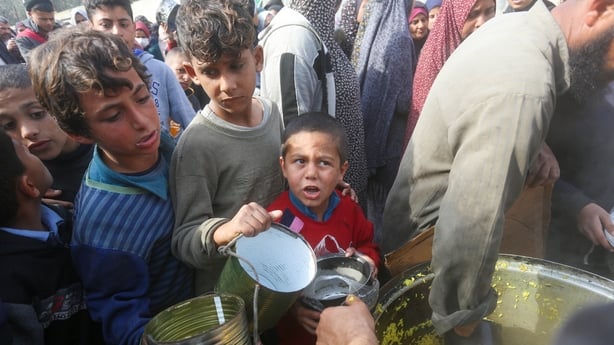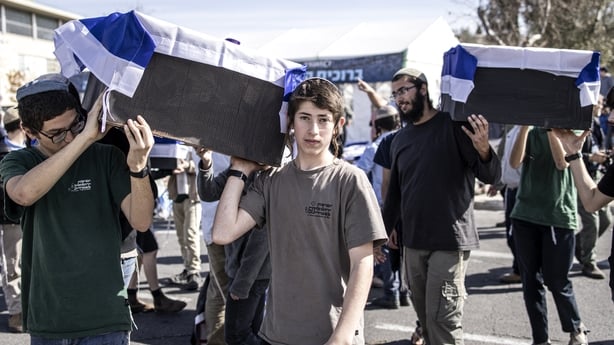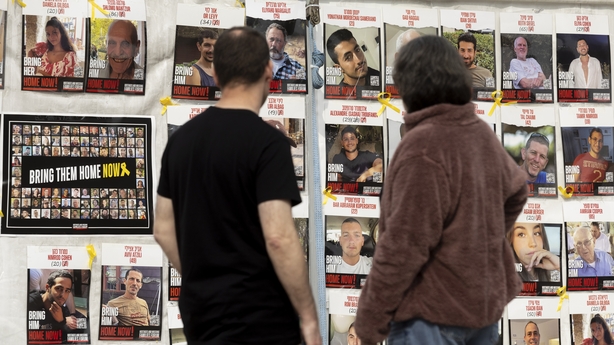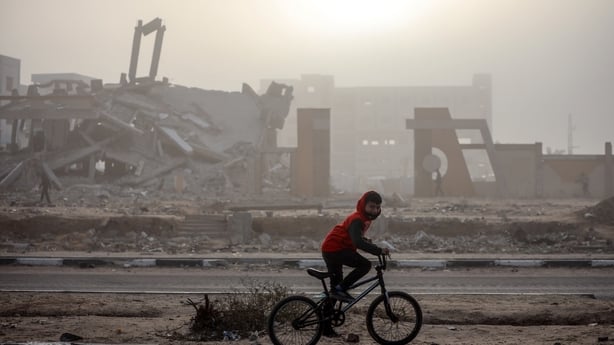Israel's cabinet approved a deal with Palestinian militant group Hamas for a ceasefire and release of hostages in Gaza, Prime Minister Benjamin Netanyahu's office said, a day ahead of the agreement's scheduled start.
In the early hours of the morning after meeting for more than six hours, the government ratified the agreement, Mr Netanyahu's office said in a statement.
Under the deal, bitterly opposed by some cabinet hardliners, a six-week ceasefire is due to take effect, with the first of a series of hostage-for-prisoner exchanges that could open the way to ending the 15-month war in Gaza.
Media reports said 24 ministers in Mr Netanyahu's coalition government voted in favour of the deal while eight opposed it.
The Israeli security cabinet earlier voted in favour of the ceasefire accord, the first of two approvals required.
The war between Israeli forces and Hamas has razed much of heavily urbanised Gaza, killed more than 46,000 people and displaced most of the enclave's pre-war population of 2.3 million several times over, according to local authorities.
If successful, a ceasefire could ease hostilities in the Middle East, where the Gaza war spread to include Iran and its proxies - Lebanon's Hezbollah, Yemen's Houthis and armed groups in Iraq as well as the occupied West Bank.
In Gaza, Israeli warplanes kept up heavy strikes, and the Palestinian civil emergency service said 116 Palestinians, almost 60 of them women and children, had been killed since the deal was announced on Wednesday.
Under the six-week first phase of the three-stage deal, Hamas will release 33 Israeli hostages, including all women (soldiers and civilians), children, and men over 50.
Israel will release all Palestinian women and children under-19 detained in Israeli jails by the end of the first phase.

The justice ministry earlier published a list of 95 Palestinians to be freed starting Sunday, "subject to government approval".
They include 69 women, 16 men and 10 minors.
The Israel Prison Service said it would prevent any "public displays of joy" when Palestinian prisoners are released.
The ceasefire would take effect on the eve of Donald Trump's inauguration as US president.
Claiming the proposed deal "supports achieving the objectives of the war", Mr Netanyahu's office announced that the security cabinet recommended that the government approve it.
We need your consent to load this rte-player contentWe use rte-player to manage extra content that can set cookies on your device and collect data about your activity. Please review their details and accept them to load the content.Manage Preferences
Palestinian president Mahmoud Abbas said the Palestinian Authority has completed preparations "to assume full responsibility in Gaza" after the war.
Even before the truce begins, displaced Gazans were preparing to return home.
"I will go to kiss my land," said Nasr al-Gharabli, who fled his home in Gaza city for a camp further south. "If I die on my land, it would be better than being here as a displaced person."
In Israel, there was joy but also anguish over the remaining hostages taken in the Hamas attack.
Kfir Bibas, whose second birthday falls on Saturday, is the youngest hostage.

Hamas said in November 2023 that Kfir, his four-year-old brother Ariel and their mother Shiri had died in an air strike, but with the Israeli military yet to confirm their deaths, many are clinging to hope.
"I think of them, these two little redheads, and I get shivers," said 70-year-old Osnat Nyska, whose grandchildren attended nursery with the Bibas brothers.
'Confident'
Two far-right ministers earlier voiced opposition to the deal, with one threatening to quit the cabinet, but US Secretary of State Antony Blinken said he believed the ceasefire would proceed.
"I am confident, and I fully expect that implementation will begin, as we said, on Sunday," he said.
Gaza's civil defence agency said Israel bombed several areas of the territory, killing more than 100 people and wounding hundreds more since the deal was announced on Wednesday.

Hamas's armed wing, the Ezzedine al-Qassam Brigades, warned that Israeli strikes were risking the lives of hostages and could turn their "freedom... into a tragedy".
The 7 October attack on Israel resulted in the deaths of 1,210 people, mostly civilians, according to an AFP tally of Israeli official figures.
Of the 251 people taken hostage, 94 are still in Gaza, including 34 the Israeli military claims are dead.
Israel's retaliatory war in Gaza has destroyed much of the enclave, killing 46,876 people, most of them civilians, according to figures from the health ministry, which the UN considers reliable.
RTÉ Deputy Foreign Editor Edmund Heaphy reports from Tel Aviv ahead of the Israeli cabinet signing off on the ceasefire deal
Trump and Biden
The ceasefire agreement followed intensified efforts by mediators after months of fruitless negotiations, with Mr Trump's team taking credit for working with US President Joe Biden's administration to seal the deal.
"If we weren't involved... the deal would've never happened," Mr Trump claimed in an interview yesterday.
A senior Biden official said the unlikely pairing had been a decisive factor.
Qatari Prime Minister Sheikh Mohammed bin Abdulrahman bin Jassim Al-Thani, announcing the agreement on Wednesday, said an initial 42-day ceasefire would see 33 hostages released.
He said: "We seek a full implementation of the first phase, and for the second phase to be the final.
Read more:
Follow live updates
US says Gaza ceasefire to start on time despite 'loose end'
Timeline - Major moments in the Israel-Hamas war
"We are waiting for the Security Council to issue a binding resolution to implement the agreement."
The Israeli authorities assume the 33 are alive, but Hamas has yet to confirm that.
Also in the first phase, Israeli forces would withdraw from Gaza's densely populated areas and allow displaced Palestinians to return "to their residences", he said.
Two sources close to Hamas told AFP three Israeli women soldiers would be the first to be released on Sunday evening.
The women may in fact be civilians, as the militant group refers to all Israelis of military age who have undergone mandatory military service as soldiers.
Once released they would be received by Red Cross staff and Egyptian and Qatari teams and taken to Egypt for medical examinations before returning to Israel, one source said on condition of anonymity.

Israel "is then expected to release the first group of Palestinian prisoners, including several with high sentences", the source added.
Egypt is hosting technical talks on the implementation of the truce, state-linked media reported.
French President Emmanuel Macron said French-Israeli citizens Ofer Kalderon and Ohad Yahalomi were among hostages to be freed in the first phase.
Mr Biden said the second phase could bring a "permanent end to the war".
In aid-starved Gaza, where nearly all of its 2.4 million people have been displaced at least once, aid workers worry about the monumental task ahead.
"Everything has been destroyed, children are on the streets, you can't pinpoint just one priority," Doctors Without Borders (MSF) coordinator Amande Bazerolle told AFP.

